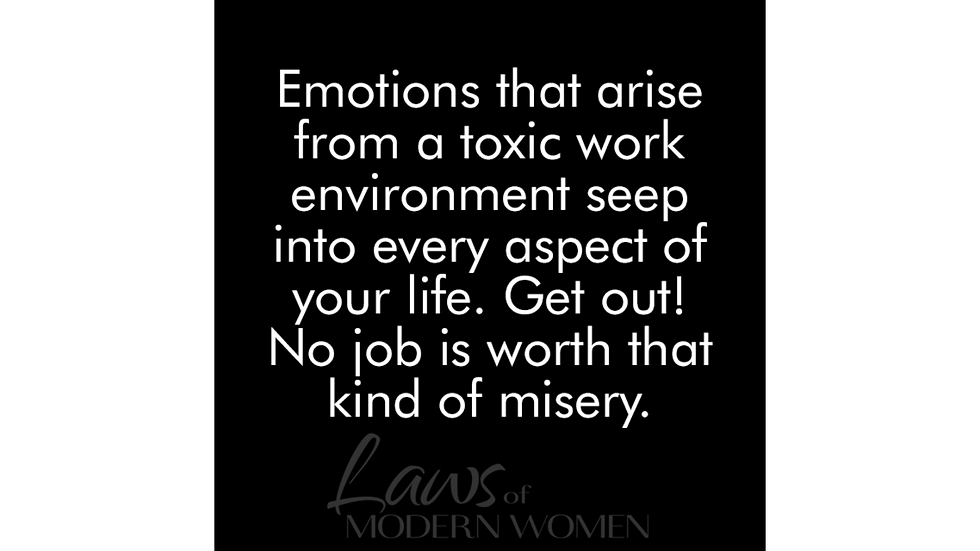10 Critical Health Related Issues From Working In A Toxic Work Environment
- Gifford Thomas

- Jan 31, 2020
- 6 min read

"After working in a toxic environment for seven years, I decided to quit my job in a last-ditch attempt to save my sanity. After I quit, I went to the doctor who said my stress levels were dangerously high, and I was going to cause myself long term physical and mental health damage. I needed three months to recover from the trauma before I could face going back to work. I am still in the same profession now, but I choose to work for companies that take better care of their employees, and now I work much better hours, don’t allow anyone to make me feel pressured, and I am open with my colleagues if I am struggling to cope. Now I put myself first, and I am no longer a people pleaser."
These stories are becoming so prevalent; it’s becoming a serious cause of concern because now you are talking about people’s health, and no job should ever be the cause of anyone’s health-related issues. The link between adverse health and a lousy workplace is “significant, profound, and has been documented over decades,” according to Jeffrey Pfeffer, a professor of organizational behavior at Stanford Graduate School of Business and author of “Dying for a Paycheck: How Modern Management Harms Employee Health and Company Performance — and What We Can Do About It.”
Pfeffer said it’s a significant health crisis, resulting in over 120,000 excess deaths a year in the United States. Ironically, research shows that stressful workplaces aren’t even good for employers. Pfeffer notes that stressed people are more likely to quit and come into work sick. And beyond a certain point, long work hours actually harm productivity.
Pfeffer further argued that being in an awful job doesn’t just impact your health directly. “People who are stressed are more likely to smoke more, drink more, they’re more likely to overeat ... they’re more likely to engage in illicit drug-taking, and they’re less likely to exercise. So, stress affects not only people’s health directly, but through its effect on their individual health-relevant behaviors.”
Here are some health-related issues from working in a toxic work environment, you must be aware of, and how they can negatively impact your health as indicated by RAVEN ISHAK.
Depression
Working in an environment where a boss or co-worker seems to mute your talents and self-worth can amplify existing mental health issues.
According to a 2012 analysis, perceptions of unfairness and inequality were commonly associated with increased depression. Unfortunately, this toxic health issue doesn’t just stay within the confines of your office. Depression can often leak into your personal life, making you second-guess yourself, your relationships, and your potential.
Insomnia
Falling asleep and staying asleep might not be very high on your to-do list when you’re expected to work around the clock.
A toxic work environment can lead you to experience anxious thoughts at night, which can prevent you from getting enough quality shut-eye. But be careful of this becoming a lasting pattern, as your sleepless nights can impact your judgment, clarity, and perspective, preventing you from tackling future stressful situations.
Heart attack
In addition to a toxic work environment, being laid-off can cause damage to more than just your bank account.
According to a Duke University study, losing a job can up your chances of having a heart attack by 22 percent. But that’s not the end of it. If you’re one of the unlucky few who has lost more than three jobs during your career, your chances of having a heart attack can go up to 52 percent. Yikes.
Stress
While it would be a dream to refrain from stressing out at work, unfortunately, it comes with the paycheck.
However, if your job doesn’t give you a sense of purpose, you may want to reconsider your position. Jan Bruce, CEO and co-founder of meQuilibrium told Fortune, “The data we collect while working with large communications, technology, and healthcare companies show among highly stressed employees, 72% report having a low connection to their work.” This comes as no surprise when you look at the big picture. When there’s a disconnection from the company’s mission, the long hours and toxic bosses can cause you to stress out.
Fatigue
Even when we say that we’re going to stop working, we don’t. This can make us feel fatigued and burnout.
And while we could point the finger at ourselves, our company’s toxic culture is also to blame. For instance, if your boss is sending you an email at 11 p.m., they’re showing you that boundaries do not matter at your job. Pfeiffer explained to Slate that with technology, our employers are expecting us always to be “on.” Even though this expectation might be true, it doesn’t mean we should.
Anxiety
Not only is a toxic work environment stressful, but it can also cause you to have anxiety.
And when anxiety becomes a part of your daily life, it could mean that your job doesn’t support a healthy work-life balance; rather, it encourages office gossip or has unrealistic expectations for its employees. Monster states that one of the best ways to break this cycle is by scheduling relaxation time throughout the day and to say no to multitasking. However, if your boss is micromanaging you to stay at your desk, you may need to clock out of this toxic job for good.
High blood pressure
While any superior might be tough every now and then, a toxic superior could be detrimental to your health.
In a study that was published in the Journal of Occupational Health Psychology, researchers found that employees who had negative reactions to their bosses also experienced elevated blood pressure that lingered well into the night. Why might this be the case? Well, researchers believe that rumination (aka mentally analyzing a single event over and over again) is at play. But if you’re able to separate home and work life, then you may be able to live a healthier life.
Feeling sick
When your immune system shuts down from stress, your body can’t protect itself from diseases and illnesses.
Because toxic work environments can drive your stress levels to an all-time high, your job is more inclined to make you sick. According to The Atlantic, when you experience chronic stress, it can lower the function of your immune system, making you more susceptible to diseases and illnesses. While you might have hand sanitizer at your desk to get rid of the germs, there’s not enough hand sanitizer in the world to get rid of a toxic work environment.
Paranoia
Toxic work environments breed instability, fear, and uncertainty. But mix that with poor communication, and you’ll receive a tall order of paranoia.
Poor work cultures will lead employees to assume they’re inevitably going to lose their jobs because their bosses might make them feel inadequate or office gossip about the company might plague their thoughts. According to Psychology Today, these tactics can create stress, paranoia, and a feeling of adrenaline, making you feel less confident in yourself.
Negative outlook
When your office culture goes off the rails, it can be hard not to let it affect your personal life.
You’re more inclined to engage in negative self-talk and complain about your job when you work in a toxic work environment. While this can definitely impact your personal relationships, it can also affect the relationship you have with yourself. When you’re not able to pull yourself out of this negative mindset, you have more of a chance to become addicted to the drama and behavior, which can be harmful to your health in the long run.
Never let any job affect your health; it makes no sense to allow yourself to suffer for a job that does not value you as a professional and as a person. The company will replace you; God forbid, if something were to happen to you, it’s as real as that.
This world is overflowing with opportunities, and you should never feel trap in a job for the sake of a paycheck. When you understand the power inside of you and your infinite abilities, you will never be a slave for a salary.
Your health is your wealth and the people who truly value you, your husband, wife, children, and family, friends need you to be around for a long time, save your time and energy for them and to help make a difference in this work; never for an employer who cares nothing about you.
---------------------------------------------
About Gifford Thomas

I am the founder of Leadership First and the author of The Inspirational Leader, Inspire Your Team To Believe In The Impossible. At Leadership First, we are committed to publishing the very best inspirational leadership quotes and articles to inspire our 300,000+ community of leaders to believe in the impossible, while creating an environment free from toxic, fearful and intimidating leadership. We believe everyone can and should enjoy their work, but it must start with the leadership leading by example. Follow our community of leaders HERE, and let's change the leadership status quo to help inspire and motivate our leaders to make a difference and create an organization their people will love.
You can download a copy of my book The Inspirational Leader, Inspire Your Team To Believe In The Impossible by clicking the link below










Working in a toxic work environment can have serious consequences for an individual's physical and mental health. Some of the critical health-related issues that can arise from being in such an environment include:
To excel in the pharmaceutical representative job search, start by obtaining a relevant degree and networking within the industry. Customize your resume and cover letter, highlighting your product knowledge and communication skills. Research companies thoroughly and consider informational interviews. Stay persistent and informed about industry trends to enhance your chances of securing a position...
Post Office Job Placement
By applying for the shop act license, business demands for the endorsement of the Department of Labor to work. It is dependent upon occasional assessments/visits by concerned Government authorities.